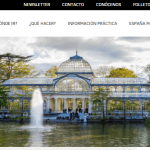SEGITTUR and the Institute of Tourism for the Region of Murcia (ITREM) will work together on the Smart Destinations project in the Region of Murcia. This initiative is the result of the agreement signed today between the Chairman of SEGITTUR, Enrique Martínez Marín, and the director of the ITREM, Juan Francisco Martínez Carrasco.
The agreement establishes that both organisations will work on the design and development of a joint work strategy and programme on Smart Destinations within the Region of Murcia to promote the extension of the model across the region. Working with SEGITTUR, the Secretary of State for Tourism has developed a methodology based on five areas of action (governance, innovation, technology, accessibility and sustainability), within which over 400 requirements are assessed as the starting point for the conversion of a destination into a Smart Destination.
This methodology has been praised by international organisations such as the World Tourism Organization (WTO), the European Commission and the Inter-American Development Bank.
The initiative aims to implement the Smart Destination diagnostic methodology and action plan developed by the Secretary of State for Tourism across the destinations within the Region of Murcia, as well as other tools needed to consolidate its development in the participating destinations.
The agreement also includes the design of a training programme aimed at experts from the tourist destinations within the Region of Murcia, and the creation of expert training programmes on which SEGITTUR will share its relevant knowledge.
It is worth noting that in 2017, Murcia hosted the first WTO World Conference on Smart Destinations, organised by the WTO, the Spanish Government and the Region of Murcia. The ITREM is now part of the Smart Destinations Network, the objective of which is to promote synergies and the sharing of knowledge.
According to the Chairman of SEGITTUR, the signing of this agreement is an important step in destinations opting to become Smart Destinations, which adds value to destinations through innovation and technology, resulting in increased competitiveness, more efficient processes, a boost to sustainable development, higher quality stays for visitors and a better quality of life for residents.





